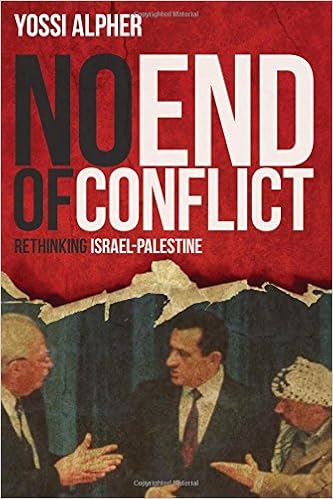Author and analyst Yossi Alpher has a fond spot in his heart for the work done by Peace Now and its international affiliates. At the same time, he has a tough message for the organization: there is, at this time, no hope for a peaceful resolution of the Arab-Israeli conflict resulting in a two-state solution.
At the same time, he has a message for the right-wing nationalist camp as well, which might otherwise feel vindicated in its skepticism of the peace process. We are on route to a place no one wants to go to: a bi-national state that will either be undemocratic, or not Jewish.
“We are on a slippery slope to an ugly, one-state reality,” he said.
READ: ANALYST SETS OUT AGENDA FOR TACKLING MIDEAST CRISES
Alpher, author of No End of Conflict; Rethinking Israel-Palestine, was in Toronto last week as part of a three-city Canadian tour organized by Canadian Friends of Peace Now, which took him to Montreal and Ottawa as well. After speaking at Congregation Darchei Noam in Toronto, he flew to New Zealand, to discuss his latest book at the Auckland Writers
Festival.

Alpher’s bona fides as an advocate of a peaceful resolution to the conflict are long and distinguished. He served as a special adviser to prime minister Ehud Barak at Camp David during negotiations with Yasser Arafat. He co-edited Bitterlemons, a website dedicated to fostering mutual dialogue, with Ghassan Khatib, a former minister in the Palestinian Authority government. He served with Israeli military intelligence and later in Mossad before becoming director of the Jaffee Center for Strategic Studies at Tel Aviv University.
So it is with a measure of reluctance that he has come to his conclusion. But it’s one born of experience and recognition of political realities, he explained.
In some ways, Alpher acknowledges, he’s repeating the nationalist critique of the peace process – that the other side will never agree to a final settlement unless all its demands are met, including the right of return of millions of Palestinian refugees to Israel, spelling an end to the Zionist endeavour.
But, he continues, the nationalist Israeli camp, by expanding its settlements and gobbling up land, is making it impossible for any arrangement that will be palatable to the Palestinian side.
And he rejects as “dreaming” the views of some in the government that the Palestinians will ever accept the status quo if their economic condition improves or that they will ever be satisfied with autonomy.
In all, Alpher’s analysis presented a rather bleak view of the prospects for peace. And as far as he is concerned, there is plenty of blame to go around.
“I wrote the book because I was fed up with the approach of the international community, like statements from Leon Panetta, [the former U.S.] secretary of defence, to just get back to the damn table, from [former British prime minister Tony] Blair and [U.S. Secretary of State John] Kerry, that the outline of the solution is there.
“Nothing could be further from the truth,” he said.
Based on his experience and from examining the offer presented in 2008 by former Israeli prime minister Ehud Olmert to Palestinian Authority President Mahmoud Abbas, which “went way beyond Camp David,” Alpher believes “the Oslo process has run its course.”
READ: TORIES URGE CANADA TO RECONSIDER RELATIONS WITH IRAN
As far as he is concerned, issues pertaining to the post-1967 conflict are resolvable (borders, settlements, a capital in Jerusalem), but those connected to pre-1967 are not. These include the return of millions of Palestinian refugees and their descendants to Israel.
Furthermore, how can you come to an agreement when Abbas denies there ever was a Jewish Temple in Jerusalem? In saying that, he rejects the Jewish connection to the land and the notion that the Jews are the native people coming back to their country, he said.
“The two parties are not close to agreement,” he added.
Alpher acknowledges he doesn’t have a solution to the conflict, but he advises North American Jews to accept reality and prepare for a difficult future in which Israel is bound to become a unitary state with a Palestinian majority, or even a strong minority.
The Diaspora Jewish communities will have to manage a relationship in which Israel “is no longer a Jewish state or the state of the Jewish people,” he warned.
